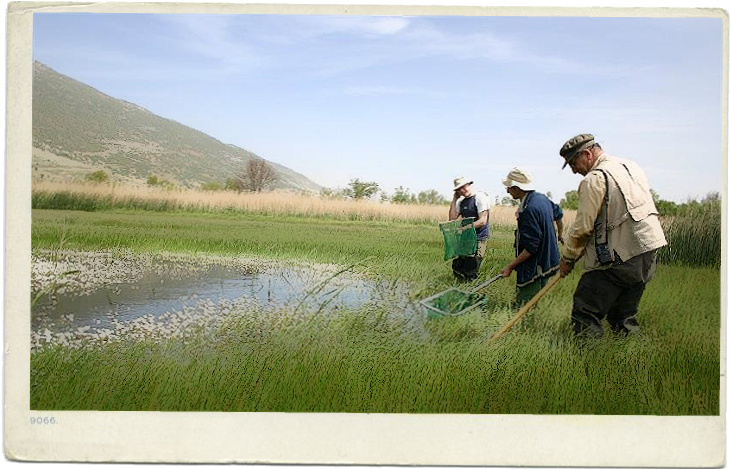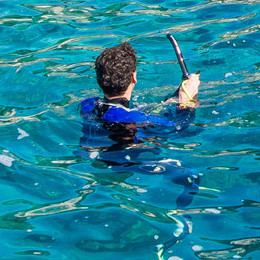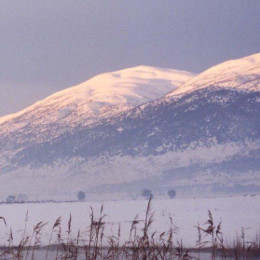Postcards from the Middle East by Chris Naylor: 6. Crossing cultures
2000 Aammiq Wetland, Lebanon

In the spring of 2004 and again in 2005, a team of herpetologists from Lebanon, France and the UK surveyed 76 Lebanese sites for frogs, finding five species, including the Eastern Spadefoot, a first record for the country
From the very beginning, when the Harrises had asked us to lead the project, my greatest anxiety had been how on earth we would recruit the team with the wide range of skills needed to see the conservation of the wetland through. We needed, to name but a few: hydrologists, botanists, agriculturalists, educators, entomologists, and ornithologists, as well as water engineers, eco-tourism providers, and business strategists.
The answer came in the shape of the many different nationalities of team members, volunteers, and resident experts who gave extravagantly of their time, and for some whole chunks of their lives. Mostly our long-term team members were either locally employed or came as self-funded volunteers through the A Rocha network. We were supported by a host of experts drawn largely from fellow conservation NGOs that grew, while we were there, to be the backbone of the conservation movement in the country, supported by the Ministry of Environment and several university departments. To give some idea of the scale of global support, these are the nationalities of the team and long-term volunteers that worked with us through our time in the project: three from the USA, seven Brits, four Canadians, one Dutch, two French, four Lebanese, one Palestinian, two Syrians, one Swiss, and a New Zealander, as well as other innumerable volunteers from all over the world.
They all added to the richness and the hard grind of cross-cultural working. I loved working with such a diverse group. Nevertheless, a cross-cultural team is hard work. Everyone comes with their own cultural presuppositions, except they don’t see them as presuppositions at all. Each of us brings a set of norms, ways we see the world and ways we expect others to see it. These are products from our culture – comforting, normal, and shared; well, at least they are shared back home. The trouble with working outside of your home country is that other cultures have their own presuppositions and they think they are normal too! With ever-increasing globalization, cross-cultural teams are more and more common, but mostly they don’t operate as such. There is usually one dominant culture and that is most commonly the prevalent culture in situ. Those from outside of this culture adapt and fit to the prevailing expectations and norms around them, and the team, although drawn from different nationalities, works in a mono-cultural way. This is easier, certainly, and often works very well, but it is not functionally cross- or even multicultural.
It wasn’t like that for us. Usually there was not one dominant nationality, and even if there was it was never Lebanese, the cultural context where we all worked. It all led to a lot of discussion – trying to tease apart why Charbel had said that, and why Carol was so upset, and why the Lebanese schools were always late!
Time, punctuality, and lateness were certainly one of the default conflict zones; another was status. Different cultures can view status, how you get it, what it means, and how you can lose it, in quite different ways. Amongst some of our Lebanese team, we discovered a heightened sensitivity for the appropriateness of assignments given to particular team members that we rarely found with the more international set. An example might help here.
Richard and Yusef were in the middle of the wetland and they had a task to do. Richard was a PhD freshwater biologist from New Zealand and Yusef a recent biology graduate from a Beirut university. They were both team members, and in the heat of the late summer afternoon needed to take a sediment sample with an auger. An auger is like a great big apple corer that you screw into the ground and pull out, with several feet of sediment preserved in their depositional strata. It is hard, hot work and can take up to an hour a sample if the ground is hard. And today the ground was hard.
“Right, your turn,” said Richard. “I think I got it down another foot.”
Yusef took the auger and after a few ineffective turns flopped to the ground, angrily turning to Richard, saying, “This is ridiculous! We should not be doing this. It’s too hot, and anyway we should employ a labourer for this sort of work. It’s manual!” The last word was said as if it were a four-letter word.
Richard was completely confused. “But you said you were happy to help. You know we have to do it ourselves. I explained at the team meeting we can’t employ anyone as it has to be done just so – otherwise the auger is likely to break off in the hard clay, and it’s the only one we’ve got. This is what fieldwork is all about – it’s great to be outside; just look around! What an amazing privilege to be out in a place like this and call it work. Where could possibly be better?”
Yusef’s answer was heartfelt even if it was under his breath: “In an office with air-conditioning and a big desk!”
The soil sample was eventually taken, Richard doing 90 per cent of the work, but the incident led to a much greater understanding of Yusef’s perspective as we talked about it afterwards. Yusef had recently graduated. He had a BSc. He and his parents had made great sacrifices so that he could get his degree. He did not sign up to the project for this. It was beneath him, and what is more, far below Richard, who was a doctor of science! Yusef was happy to study birds, water levels, plants – “study” being the operative word because that was a task that required respect. It was science. He had studied hard and had earned that right. He had not worked all those years so he could dig holes.
As a project, we had to learn to respect both the New Zealand pioneer spirit, complete with its zeal for the outdoors and enjoyment of manual labour, and the cultural appropriateness of tasks required of local staff. Although foreigners could happily ignore the messages given out by their activities, for a local team member, taking part in tasks that were seen as beneath them or demeaning had real consequences for their social standing, which understandably they were keen to preserve.
This is the last of six excerpts from Postcards from the Middle East by Chris Naylor. Published by Lion Hudson in March 2015, it can be ordered from its page on the Lion Hudson website
We are happy for our blogs to be used by third parties on condition that the author is cited and A Rocha International, arocha.org, is credited as the original source. We would be grateful if you could let us know if you have used our material, by emailing [email protected].



